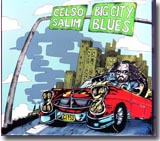 Big City Blues (GRV
Records) is the third album
by Celso Salim, and it is arguably the best yet,
certainly to my ears – maybe because it is bluesier then
the earlier two. The CD benefits from
having 12 original songs and just one cover version (“If
The Sea Were Whiskey”), and the original songs are all
good.
Big City Blues (GRV
Records) is the third album
by Celso Salim, and it is arguably the best yet,
certainly to my ears – maybe because it is bluesier then
the earlier two. The CD benefits from
having 12 original songs and just one cover version (“If
The Sea Were Whiskey”), and the original songs are all
good.
Salim shows his
instrumental diversity by playing dobro, electric and
acoustic guitars – backed by Jason Sterling on drums,
Rodrigo Mantovani on bass and guest artists Ari Borguer
(piano), Igor Prado (guitar), Sergio Duarte (harmonica)
and others.Salim is very obviously a
talented musician, and he has been playing guitar since
the age of 6; he studied at the Musicians Institute in
Los Angeles, and joined a local blues band in the area,
before moving back to his native Brazil in 2000.
This is his first album
since the 2003 release Going Out Tonight, and it has
been worth the wait. The album contains lots of
different tempos and styles of blues, from driving
rocking blues to simple picking, and obviously has many
different influences.
The opening track “Best
Cheater In Town” is a rocking blues, with some superb
harmonica work from Sergio Duarte backing Celso’s
stylish slide guitar work. “Truthful Liars” keeps to
the same tempo and style with its driving, insistent
beat, and slips into track three, the title track “Big
City Blues,” slowing down the tempo slightly and
showcasing some nice piano work by Ari Borguer.
Track four, “Sweet Lovin’
Queen,” is pure Muddy Waters-influenced and is possibly
the best track on the album – the slide guitar is pure
heaven! I’d buy the CD for this track alone. The cover of Willie
Dixon’s “If The Sea Was Whiskey” is another contender
for best track on the album, staying true to the
original without being a direct copy.
There isn’t a bad track on
the album, it’s just that some are better than others. There seems to be some
high standard blues coming out of Brazil at the moment,
and this is a good listen.
--- Terry
Clear
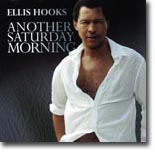 Ellis Hooks
has dazzled listeners with his ragged but righteous
vocals since his initial release in 2002. His music
features the best of ’60s and ’70s Southern blues and
soul with just the right amount of rock thrown in for
good measure. His songwriting, usually a joint effort
with longtime producer Jon Tiven and his wife Sally,
touches on the sounds of Muscle Shoals-era soul, but
also brings to mind Van Morrison at times.
Ellis Hooks
has dazzled listeners with his ragged but righteous
vocals since his initial release in 2002. His music
features the best of ’60s and ’70s Southern blues and
soul with just the right amount of rock thrown in for
good measure. His songwriting, usually a joint effort
with longtime producer Jon Tiven and his wife Sally,
touches on the sounds of Muscle Shoals-era soul, but
also brings to mind Van Morrison at times.
Hooks’ fifth release,
Another Saturday Morning
(Evidence), features more of the same exciting mix of
rock, blues and soul. The opening cut, “Black Dirt,”
kicks off the disc in fine fashion, and “Don’t Stop
Dancing” is a strong upbeat number. “Your River” sounds
like a long lost Van Morrison track. “Don’t Come
Running” is another highlight, featuring the harp work
of Mason Casey and a powerful vocal from Hooks.
“Bad MF” has a strong early
’70s vibe, with the funky
Hammond organ and horn section, all performed by Jon Tiven, who also contributes a great guitar solo. “Rain
On The Wood” is a gritty soul number about the
frustrations of love (“It’s hard to light a fire with
rain on the wood.”), while the title cut is a more
meditative number about times gone by. “Do I Ever Cross
Your Heart” is a classic soul track about the girl left
behind, and the rocking “The Road To Your Heart” raises
things up a notch to close things out. There’s also a
bonus track, the seasonal “If I Gave You My Heart For
Christmas.”
Another Saturday Morning is another great addition to
the Ellis Hooks catalog, featuring his unique and
seamless mix of Southern blues and soul.
--- Graham
Clarke
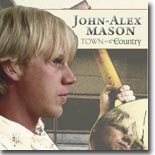 John-Alex
Mason has absorbed musical influences from many
different directions. The guitarist’s older brother
listened to ’60s and ’70s icons like Led Zeppelin, the
Grateful Dead, the Allman Brothers, and Jimi Hendrix,
while his godmother introduced him to the spiritual side
with her gospel singing. From there, the Colorado native
picked up on the blues as a teenager and eventually won
the Telluride Acoustic Blues Competition in 2001, was hired to teach slide guitar at the festival’s blues
camp, and came under the influence of contemporary
artists like Taj Mahal, Alvin Youngblood Hart, Richard
Johnston, and Cephas & Wiggins. Since then he has won
several awards and has played with many blues greats
like B. B. King, James Cotton, Bob Margolin, Jimmie
Vaughan, and Robert Belfour.
John-Alex
Mason has absorbed musical influences from many
different directions. The guitarist’s older brother
listened to ’60s and ’70s icons like Led Zeppelin, the
Grateful Dead, the Allman Brothers, and Jimi Hendrix,
while his godmother introduced him to the spiritual side
with her gospel singing. From there, the Colorado native
picked up on the blues as a teenager and eventually won
the Telluride Acoustic Blues Competition in 2001, was hired to teach slide guitar at the festival’s blues
camp, and came under the influence of contemporary
artists like Taj Mahal, Alvin Youngblood Hart, Richard
Johnston, and Cephas & Wiggins. Since then he has won
several awards and has played with many blues greats
like B. B. King, James Cotton, Bob Margolin, Jimmie
Vaughan, and Robert Belfour.
These various influences all play an important part in
Mason’s fifth, and latest, CD, Town and Country (Naked
Jaybird Music), a remarkable display of electric and
acoustic guitar that would have been a seamless fit in
the old Paramount catalog if you didn’t know better. A
mixture of old songs and new compositions by Mason, it’s
sometimes hard to tell which is which.
The old recordings include two versions (one featuring
his one-man band setup) of “Shake ‘Em On Down,” Bukka
White’s “Jitterbug Swing,” Skip James’ “Cypress Grove,”
Charlie Patton’s “Boll Weevil,” and the Elmore James
classic, “Shake Your Moneymaker.” Mason’s originals
include “Steel Pony Blues,” “Bury My Boots,” about being
torn between playing his music on the road and staying
home with family, “Chef Menteur,” a scathing response to
the after-effects of Katrina, and “Strange Things,” a
despairing tune about the current state of world
affairs. The spiritual “What Are You Hungry For?” is a
tribute to his godmother, and the driving “Locomotive”
churns on just like its title.
The “Town” tracks feature Mason on electric guitar,
LoweBow cigar box guitar, and footdrums, while the
“Country” tracks feature Mason on his National Style O
guitar. While he is a fantastic guitarist, his vocal
work is extraordinary, as he easily captures the fire
and passion present in the best blues songs. In addition
to his fretwork and vocals, Mason is a gifted composer,
whether touching on old familiar themes or more topical
matters.
Guitar fans will find a lot to love here, but fans of
acoustic blues shouldn’t let this one pass them by,
either. Town and Country is one disc you’ll be hearing a
lot about in 2008.
--- Graham
Clarke
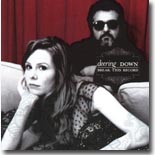 Canadian
singer Lahna Deering met guitarist Rev Neil Down in
Alaska and formed the duo, Deering and Down. The pair’s
first two discs were recorded in Alaska and Ireland,
respectively, and garnered a fair amount of attention
for their originality. Since 2004, they’ve been in
Memphis, soaking in the atmosphere and musical
influences of the Bluff City. Their third album, Break
This Record, was recorded in Memphis and released on
North Mississippi Allstars’ Cody Dickinson’s new Diamond
D label.
Canadian
singer Lahna Deering met guitarist Rev Neil Down in
Alaska and formed the duo, Deering and Down. The pair’s
first two discs were recorded in Alaska and Ireland,
respectively, and garnered a fair amount of attention
for their originality. Since 2004, they’ve been in
Memphis, soaking in the atmosphere and musical
influences of the Bluff City. Their third album, Break
This Record, was recorded in Memphis and released on
North Mississippi Allstars’ Cody Dickinson’s new Diamond
D label.
Deering’s unique vocal style (call it a combination of
Stevie Nicks and Janis Joplin with a shot of helium
mixed in) is a perfect offset to Down’s guitar work,
which is a style unto its own. It leans toward the rock
side of things, with roots firmly planted in the blues,
and he complements Deering's vocals flawlessly, like a
hummingbird darting in and out and around them.
Among the highlights are “Richard of Los Angeles,” which
features a wicked solo from Down, and the mournful “Sad
Love,” with one of Deering’s best vocal efforts. “Sugar”
features a country-esque backing with a bluesy guitar
break, as does “City Cow Girl.” The upbeat “Oh So Good”
raises things up a notch or two, and “Abbey” is a sweet
song about encouraging someone going through the healing
process of a broken love. The closer, “Bessie’s Big
Wag,” is a lively instrumental showcasing Down’s guitar.
This was a difficult record to categorize (something I
hate to do in the first place). It’s not exactly rock or
blues, but features elements of both. Americana is
probably the best description, but it’s not just that
either. It reminds me a lot of those Little Feat or Ry
Cooder records from the ’70s that captured elements of
several different genres and combined them into their
very own genre. Wherever you file it, it’s one of the
most fascinating releases you’ll hear this year.
--- Graham
Clarke
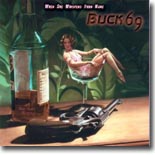 Buck 69 is a
father-son blues/rock band with three members over the
age of 45 and five members under the age of 30. Despite
the age gap, the group is definitely on the same page as
far as their music is concerned. Singer/songwriter Tom
Clawson, formerly of the band T. C. Rogers and the
Blue’s Hamilton Band founded the group along with his
son, guitarist Alex Clawson. The pair originally started
out as an acoustic duo around the Toledo, Ohio area, but
decided to go electric three years ago. It’s proving to
be a wise decision.
Buck 69 is a
father-son blues/rock band with three members over the
age of 45 and five members under the age of 30. Despite
the age gap, the group is definitely on the same page as
far as their music is concerned. Singer/songwriter Tom
Clawson, formerly of the band T. C. Rogers and the
Blue’s Hamilton Band founded the group along with his
son, guitarist Alex Clawson. The pair originally started
out as an acoustic duo around the Toledo, Ohio area, but
decided to go electric three years ago. It’s proving to
be a wise decision.
The band’s new release,
When She Whispers Your Name
(self-released), is a dazzling set of electric
blues/rock. Propelled by not one, not two, but three
lead guitarists (Alex Clawson, fellow band member Buzz
Anderson, and disc producer John Sevilla), the disc
features great original songs and covers, masterful
vocals, and a fantastic band.
The opening cut, “T-Town,” a scorcher featuring the
dynamic lead guitar of young Clawson, sets the bar
pretty high for the rest of the disc. The title cut is a
bit mellower, with more fine picking by Clawson and some
funky ’70s era keyboards by B. J. Love. Mike Morgan’s
“Cold Wind” is a smooth slow blues featuring Buzz
Anderson’s fretwork along with soulful vocals by Tom
Clawson and backing vocalists Candace Coleman and Pam
Berger.
Other highlights include the rocker, “No Time For Love,”
“Good Days Bad Days” (about coping with the loss of
Clawson’s son Thomas, to whom the disc is dedicated),
and “Someone Like Me,” which features producer Sevilla
on guitar. Sevilla also shines on a highly charged cover
of Slim Harpo’s “I’m A King Bee.” The closer, “The Best
Place,” features both Alex Clawson and Anderson on
guitar and closes the disc out in fine fashion.
Blues/rock guitar fans should run, not walk to the
band’s website (www.buck69.net) to pick up this
excellent disc.
--- Graham
Clarke
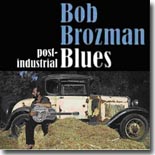 Guitar
virtuoso Bob Brozman’s third release for Ruf Records,
Post-Industrial Blues, is a stunning package featuring a
highly diverse set of originals and a couple of
well-chosen covers, all stamped with Brozman’s
inimitable style. To sum up Brozman’s gifts, if it has
strings, he can play it. On this disc alone, he plays a
variety of National guitars, ukulele, banjo, the
Okinawan sanshin, Dobro, the Greek baglama, Hawaiian
guitar, the 22-string chaturangui, and the 14-string
gandharvi.
Guitar
virtuoso Bob Brozman’s third release for Ruf Records,
Post-Industrial Blues, is a stunning package featuring a
highly diverse set of originals and a couple of
well-chosen covers, all stamped with Brozman’s
inimitable style. To sum up Brozman’s gifts, if it has
strings, he can play it. On this disc alone, he plays a
variety of National guitars, ukulele, banjo, the
Okinawan sanshin, Dobro, the Greek baglama, Hawaiian
guitar, the 22-string chaturangui, and the 14-string
gandharvi.
Always an intense and spirited performer, Brozman has
carried that over this time around to his compositions.
Several of the tracks cover American politics (“Follow
the Money,” “Crooked Blues”), Hurricane Katrina (“Look
At New Orleans”), and the war (“Three Families Blues”).
Whether you agree with his politics or not, you’ll enjoy
listening to these because, #1, he delivers the lyrics
with a wink and good humor, not the usual
heavy-handiness or self-importance that often
accompanies topical songs delivered from either side of
the aisle, and #2, his guitar work will leave you
slack-jawed. He remembers that regardless of the subject
matter, nobody’s going to listen if the music’s not
good.
There’s plenty more to enjoy on
Post-Industrial Blues
besides the occasional political commentary. Brozman
makes the amazing seem routine whenever he has a guitar
in his hands. “Strange Ukulele Blues” is an example as
Brozman doubles on ukulele and banjo for an amazing
flamenco-styled number. “Let’s Get It Boy” is another
marvel, an all-too-brief spirited instrumental with
Brozman mixing the 14-string gandharvi with his usual
National guitar.
His smooth take on “Green River Blues” is more
traditional, at least compared with one of his cover
tunes, a unique rendition of the Doors’ “People Are
Strange,” where Brozman pulls out all the stops, playing
his usual battery of guitars, along with a “broken toy
piano,” gongs, cymbals, “butterknife on table,” gongs,
woodblocks, marimba pipes, and other miscellaneous
instruments. “How I Love That Woman,” a pretty Hawaiian
guitar instrumental, closes out the disc.
Brozman gets an assist this time around from bassist
Stan Poplin and drummer Jim Norris, who both played on
many of his earlier albums. Lacey J. Dalton and Hailey
Sage contribute backing vocals to several songs as well.
For fans of any guitar style, this disc should be
required listening. It’s exhilarating,
thought-provoking and mind-boggling, and there’s never a
dull moment.
--- Graham
Clarke
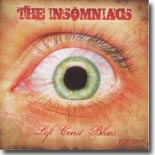 I’m sad that
I missed the record release party of The Insomniacs
new CD, Left Coast Blues, on the Delta Groove
label. They made a tour stop at the Big Fish Pub here in
Tempe, Arizona and I was out of town. Judging by their
record I missed a very good time. So let’s try to do
this new record justice. It’s easy to see why it
garnered the Insomniacs a Blues Music Award nomination
for Best New Artist Debut.
I’m sad that
I missed the record release party of The Insomniacs
new CD, Left Coast Blues, on the Delta Groove
label. They made a tour stop at the Big Fish Pub here in
Tempe, Arizona and I was out of town. Judging by their
record I missed a very good time. So let’s try to do
this new record justice. It’s easy to see why it
garnered the Insomniacs a Blues Music Award nomination
for Best New Artist Debut.
A stirring
bass line from Dean Mueller and an intro on the keys
from Alex Shakeri kick off the first cut, “Stick
Around.” A love song, singer Vyasa Dodson is trying to
convince his woman that his love is true. “…I know
things have been kind of rough…ask anyone….that’s the
way of love…I think you think you should stick around
for awhile”. We don’t know that she stays but at least
Vyasa is being true to his feelings. The band is very
tight and I’m impressed by Alex’s keyboard work. Vyasa’s
guitar takes the forefront on the next cut, “Serves Me
Right.” We find Vyasa trying to figure out what he
should do about a woman that he’s convinced isn’t
true…”Where does she…get her smiles from…cause it ain’t
me…cause I’ve been playing dumb…the flame of the night
been keeping me warm…serves me right, serves me wrong!”
Sound like this woman needs to go.
The
Insomniac’s count amongst their influences Junior
Watson, Charlie Baty and Hollywood Fats, all of whom can
be felt in the next cut, “Watch Your Mouth”. Vyasa’s
guitar intro is reminiscent of Junior’s work and the
entire song reflects the band’s jump blues influences.
“You better listen…cause I want it understood…a loose
lipped woman just aint no good…you’d better watch your
mouth!” A trash talking woman is trouble and Vyasa’s
clear in his understanding that this one needs to go. We
slow the tempo down on the next tune, “Stuttering
Blues”. “I’m a st…st..stuttering man…Lord, I can’t
talk…talk…worth a dime…sometimes I want to cr…cry…sometimes
I want to die”. Sometimes its easier to sing than talk
and Vyasa’s doing the best he can.
“Crime Scene”
is an instrumental in the best West Coast tradition.
Alex Shakeri again comes to the forefront, this time on
organ, and the song just jumps out of my speakers. I
hear a lot of Little Charlie influences in this song and
the band is definitely true to its traditions. “Wrong
Kind of Love” finds Vyasa appreciating the fact that his
woman has moved on. “Birds are singing…such a happy
song….ever since, you’ve been gone…and I know now, what
I wished I’d known then…you’ve got the wrong kind of
love!” Sometimes in the universe we just hook up with
the wrong one, Vyasa’s coming to the realization that
all of his friends were aware of, and he’ll be better
off to see this one go. “I’ll Treat You Right”, is a
jump blues in the best west coast tradition. “Well, I’m
not the one you sleep next to at night…the difference
between him and me baby, is I’m the one who treats you
right!” We’ve all seen situations like this, and
hopefully Vyasa’s patience with this woman will be
rewarded. After all, “I’m the one who treats you right!”
Solid fretwork by Vyasa provides the introduction for
“I’m Not Sorry.” “It’s not your fault baby…neither was
it mine…we both knew it was over…and I just couldn’t
keep on trying!” Once in a great while a relationship
will end for all the right reasons and Vyasa is firm in
his conviction that it’s the case this time. There’s no
right or wrong….it just all came to an end.
“Shake the
Chandelier” finds Vyasa reminiscing about his girl while
traveling the blues highway. “I’ve been having my
fun...out here on the road…fun’s been had and I’m just
glad…that I’m on my way home…when I get home…we’re going
to shake the chandelier!” The road’s been good but
Vyasa’s glad to get home. And when he gets there…the
reunion will be a sweet one. “I can’t sing…I can’t
dance…and I never been much for romance…but I got
money…I’d like to spend on you!” Vyasa’s aware of his
shortcomings and he’s hoping that an abundance of money
will make up for the weaknesses in his loving style.
He’s about to find out that money is not the cure for
everything, but it will go a long way! Hopefully his
girl appreciates his honesty.
The band
closes their record with another instrumental, “Be
Quiet.” The Insomniacs are a very tight quartet and this
is another song that showcases just what a great band
they are. Two live bonus tracks on the CD include an
extended version of “Serves Me Right” and “No Wine, No
Women.” “No wine…no women…some one’s got to go! Alex’s
keyboards shine on this tune and it’s a nice way to
finish off this impressive debut from the Insomniacs.
I like the
Insomniacs. Their energy is impressive and it’s easy to
see why they are such a favorite in their home stomping
grounds up in the Pacific Northwest. Vyasa Dodson, on
vocals and guitar, proves to be a very astute songwriter
as well, and that bodes well for the future. Alex
Shakeri plays a mean piano as well as organ and the
rhythm section of Dean Mueller on bass and Dave Melyan
on drums was very tight.
Left Coast
Blues is a well crafted debut disc and Delta Groove
Records has definitely added a gem to their already
impressive stable of artists.
--- Kyle Deibler
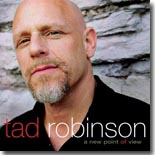 Tad
Robinson’s Did You Ever Wonder? (Severn) was one of
the standout discs of 2004. A fantastic bluesy disc, it
was thrilling as few recordings this side of Johnny
Adams were that year. A New Point of View (Severn)
takes that further down the block into Soulsville,
without giving up that bluesy root.
Tad
Robinson’s Did You Ever Wonder? (Severn) was one of
the standout discs of 2004. A fantastic bluesy disc, it
was thrilling as few recordings this side of Johnny
Adams were that year. A New Point of View (Severn)
takes that further down the block into Soulsville,
without giving up that bluesy root.
Robinson may be the
premier white soul singer on the scene. This certainly
affirms that he’s the best to come down the road in
ages. Steeped in shades of Hi and Stax soul, Robinson
again has one of the standout discs of this year. With a
stellar supporting cast, including Alex Schultz playing
outside of his typical West Coast style, bassist Steve
Gomes and Robb Stipka on the drums, this thrills from
the downbeat. From the opening “Long Way Home,” with its
sexy slinky Motown groove to the Curtis Mayfield
inspired closer, “Back for More,” this is deliciously
exciting.
The majority of songs were co-written by
Robinson – three with Lou Pride among the authors -- and
Tad’s harp work on “Up and Down World,” a tune closely
associated with both Bobby Bland and Johnny Adams,
points to his diversity. “He’s Movin’ In (To her Life)”
is a killer blues out of the Adams mold, and “More Good
Than Bad” and “When You’re Ready” ” have Al Green
dripping all over them. Whew!
--- Mark
E. Gallo
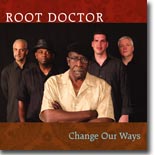 Root Doctor
is finally starting to be recognized as one of the
hottest bands on the international blues landscape.
They’ve gotten solid press from the UK to France and
Italy, to Wyoming, New York and Detroit -- and the
accolades are all well earned.
Root Doctor
is finally starting to be recognized as one of the
hottest bands on the international blues landscape.
They’ve gotten solid press from the UK to France and
Italy, to Wyoming, New York and Detroit -- and the
accolades are all well earned.
This is a fantastic band.
On their new disc, Change Our Ways (Big O
Records), from the spectacular Albert King-inspired opener, “Blues
Will Take Care Of You,” to the funky “Keep Our Business
Off the Streets” to the gospel and soul drenched “Lucky
One,” lead vocalist Freddie Cunningham and his mates
don’t just impress, they knock this listener right over.
“People Say” reminds more than a dab of the Meters, the
original source of this killer funk tune, with a dash of
Sly & The Family Stone thrown in the mix. Guitarist Greg
Nagy shines on “Big Blue Cadillac,” with bassist supreme
James Williams and rock steady drummer Rick Bole laying
a foundation thick enough to support a Mack truck.
Keyboardist Jim Alfredson, who serves as the musical
director of the band, serves up some sizzling B-3 here,
too, and the guesting Motor City Horns burn it up on
this track and elsewhere.
This one will
definitely make my year-end Top 10 list. Whew!
--- Mark
E. Gallo
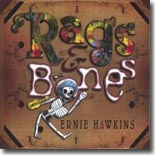 Ernie
Hawkins’ Rags and Bones (Say Mo’ Music) is as perfect an
album as fans of acoustic guitar could hope for. Hawkins
is one of the standout acoustic guitarists to come down
the road in the past decade or so. Hawkins is an
extraordinary picker who’s largely inspired by the Rev.
Gary Davis. There have been many others inspired by
Davis (Jorma Kaukonen and David Bromberg comes to mind),
of course, and there are other exquisite pickers, such
as Duck Baker and Dan Crary. And certainly, as this
collection makes apparent, Hawkins is a fan of other
classic blues guitarist and songsters. It’s just that
few performers have been able to bring so much talent to
the intersection at once.
Ernie
Hawkins’ Rags and Bones (Say Mo’ Music) is as perfect an
album as fans of acoustic guitar could hope for. Hawkins
is one of the standout acoustic guitarists to come down
the road in the past decade or so. Hawkins is an
extraordinary picker who’s largely inspired by the Rev.
Gary Davis. There have been many others inspired by
Davis (Jorma Kaukonen and David Bromberg comes to mind),
of course, and there are other exquisite pickers, such
as Duck Baker and Dan Crary. And certainly, as this
collection makes apparent, Hawkins is a fan of other
classic blues guitarist and songsters. It’s just that
few performers have been able to bring so much talent to
the intersection at once.
The opening instrumental on Davis’ “Make Believe Strut”
sets the tone. Played on a steel-stringed 12-string, the
lines are intricate, complex and wholly hypnotic. His
cover of Mississippi John Hurt’s “Avalon,” with Marc
Riesman on bass harmonica,” is a delight. The following
jaw-dropping guitar work on Davis’ playful “The Boy Was
Kissing the Girl (and Playing the Guitar at the Same
Time)” has Guy Gillette playing the bones (think of
spoons, only with bones).
Davis’ “Can’t Be Satisfied”
and “I Am the Light of This World” are also given
wonderful interpretations. The former is instrumental,
while the latter features extraordinary gospel-ish
vocals from Maria Muldaur. Jimmie Rodger’s classic “TB
Blues,” with vocals as impressive as the guitar, Henry
Thomas’ “Texas Easy Street,” again with Reisman on harp,
a great version of Willie McTell’s “Statesboro Blues,”
and Mance Lipscomb’s “G Rag” are given remarkable
readings, as well.
Hawkins covers “Singin’ the Blues,” – no, not the Guy
Mitchell song. This is a combination of Bix
Beiderbecke’s and George Gershwin’s versions of the tune
from the 1920s. Art Eskridge’s “Elm Street Blues” is a
fine guitar/vocal blues, maybe more '60s than
'20s, but classic nonetheless.
One of the real
treats here, outside of the Gary Davis material, is
Ernie Hawkins’ treatment of a pair of Louis Armstrong
compositions. “Potato Head Blues,” from the Louis
Armstrong Hot Five catalog, is given a gorgeous
interpretation. The humorously titled “Guitar Chop Suey”
comes from the same era. As Hawkins writes in the notes,
it would have made a great Rev. Gary Davis tune.
The
closing “Massanga,” a beautiful instrumental, closes the
disc. Hawkins writes of this that “an amazing
coincidence in world music is the close similarity
between many African acoustic fingerpickers of the
'50s and '60s and the American Piedmont players.”
One of finest acoustic blues artists performing today,
more info can be found on Ernie’s website.
www.erniehawkins.com.
--- Mark
E. Gallo
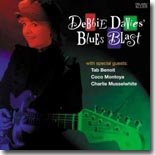 More often than not, recordings with special guests
don’t turn out well. Either the musicians don’t have
sufficient time to bond into a harmonious unit or they
are absent from the recording session. Debbie Davies'
Blues Blast (Telarc), with
three special guests, does not suffer either of those
common pitfalls due to the ensemble’s admirable
teamwork. “All of us on this record have apprenticed
under the founders of the blues,” says Davies.
“It’s from their inspiration and learning from their
records and on the road that we learned to play this
music. The older I get, the more joy I get playing with
other blues artists that I admire.”
More often than not, recordings with special guests
don’t turn out well. Either the musicians don’t have
sufficient time to bond into a harmonious unit or they
are absent from the recording session. Debbie Davies'
Blues Blast (Telarc), with
three special guests, does not suffer either of those
common pitfalls due to the ensemble’s admirable
teamwork. “All of us on this record have apprenticed
under the founders of the blues,” says Davies.
“It’s from their inspiration and learning from their
records and on the road that we learned to play this
music. The older I get, the more joy I get playing with
other blues artists that I admire.”
Los Angeles-born Davies developed her brash guitar
skills during a four-year tenure with Albert Collins’
Icebreakers. Coco Montoya also received a mentorship
from Collins. The two tutored guitarists combine their
icy Collins licks and piercing sustained notes on the
ass-kickin’ instrumental "A.C. Strut." On the Davies-written song, the guitarists freely journey up and down
their fret boards. A wistful rhythm naturally flows on
"My Time After Awhile" – made famous by Buddy Guy – where
Davies forces her vocals and effortlessly plays guitar.
Here, Katz’s organ is barely noticeable, yet it makes an
impact.
The core band (Rod Carey, bass; Per Hanson,
drums; and Katz, organ) sound tremendous on the sweet
shuffle "Sittin’ and Cryin’," where Charlie Musselwhite
astutely blows harp. His half-spoken vocals sound
ordinary on his swinging West Coast jaunt "Movin’ &
Groovin’," but his harp shines. In fact, the treasured
harp tone is some of the best he has delivered in years.
Tab Benoit’s fused-style of guitar is unrivaled. Yet, it
doesn’t fit on John Lee Hooker’s classic "Crawling King
Snake." "Where The Blues Come To Die" has such a confident
cure for your blues, they’ll perish.
The three guests
join forces with Davies and her band on the emotive
minor-key instrumental "Sonoma Sunset," named after the
beautiful wine country north of San Francisco. The
provocative song will make you laugh as well as cry.
It was Davies’ musician parents who first exposed her to
the music scene at an early age. Davies, now
55, is accompanied by at least one guest on
each song. She continues to be a more distinguished
guitarist than vocalist.
Blues Blast – Davies’
11th
career album – contains mighty fine blues as performed
by some of today’s best contemporaries.
--- Tim
Holek
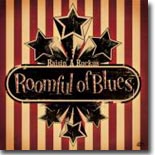 Anyone
who has listened to a Roomful of Blues CD knows
that their music is hard to classify. That doesn’t
matter to the band’s members. All they are concerned
with is whether it sounds good, whether you can dance to
it, and whether you can feel it. With suave horns that
swing off the big band dancehall floors of the ’30s and
’40s, Raisin’ A Ruckus (Alligator) is one of
Roomful’s most swinging CDs. Since 1967, the multiple
award-winning group’s combination of swing, rock ‘n’
roll, jump, blues and soul has earned it just praise. 46
band members have come and gone since then without a
negative impact on the band’s exciting music.
Anyone
who has listened to a Roomful of Blues CD knows
that their music is hard to classify. That doesn’t
matter to the band’s members. All they are concerned
with is whether it sounds good, whether you can dance to
it, and whether you can feel it. With suave horns that
swing off the big band dancehall floors of the ’30s and
’40s, Raisin’ A Ruckus (Alligator) is one of
Roomful’s most swinging CDs. Since 1967, the multiple
award-winning group’s combination of swing, rock ‘n’
roll, jump, blues and soul has earned it just praise. 46
band members have come and gone since then without a
negative impact on the band’s exciting music.
This disc
features a new bass player and a new drummer on this
disc, but the most obvious newcomer is singer Dave
Howard who replaces Mark DuFresne. Howard hails from
Rhode Island, the band’s home state, and his expressive
voice contains a hint of Louis Armstrong. Listen as
Howard reveals a state of feeling disturbed on "Black
Night," then uses his voice as the band’s fourth horn on
"Talkin’ To You Eye To Eye."
The chosen
covers are vintage blues and R&B tunes. You’ll swear
someone has just put on one of your parents records from
the 1950s when you hear their nostalgic version of "Big
Mamou," the R&B hit by New Orleans artist Smiley Lewis.
The Crescent City connection continues on the often
covered "New Orleans" and Eddie Bo’s "Every Dog Has Its
Day," which contains as much fun as a summer beach
party. "Boogie Woogie Country Girl" is loaded with
exhausting boogie woogie piano. The song’s legendary
writer, Doc Pomus, helped land the band their first
record deal in the ’70s.
Five band
members prove they are capable of writing enticing songs
that mesh perfectly with the band’s extensive
repertoire. Each of the eight original songs is a
flashback to the big band era, e.g. "In The Mood" that
influenced Roomful. On "Talkin’ To You Eye To Eye," the
three-piece brass section trade licks like guitars do in
guitar driven bands. The infectious horn arrangement of
"Solid Jam" will remain etched in your memory. Horns as
lively as a New Orleans street funeral procession appear
on saxophonist Rich Lataille’s instrumental title track.
The song, which depicts Lataille’s big band and jazz
roots, is one of the highlights of the CD. In fact, it
should be included on the soundtrack of the next ’30s
and ’40s gangster film to come out of Hollywood.
The rhythms
of all 14 songs are so exhilarating; most of the
light-hearted lyrics get lost or overshadowed. "Life Has
Been Good" stands out as its lyrics are emotionally
heavy and quite touching. It is about expressing true
feelings toward your spouse and thanking them for making
life so wonderful.
The CD’s
strength, and in fact the group’s greatest asset, is how
well the band performs as a cohesive unit. Throughout,
the horns hop, the keyboards sway, the vocals enthuse,
the guitar rocks, and the band jumps. This record swings
more than a number three wood on a golf course. You must
experience it for yourself. Put this record on and watch
as your house transforms into a building made of horns.
--- Tim
Holek
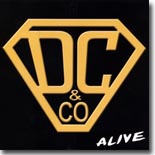 Alive,
a live album from Pennsylvania-based DC & Co, is
billed as "Live Music for Live People." But this
particular show didn't really gain life until the sixth
cut. That's when guest vocalist Rose Hudson hit the
stage for her two-song guest appearance. Ms. Hudson is
such a powerful and impressive singer that she
immediately lifted the rest of the band to new heights
--- the instrumental solos became sharper and the band
as whole rose to the occasion behind Rose.
Alive,
a live album from Pennsylvania-based DC & Co, is
billed as "Live Music for Live People." But this
particular show didn't really gain life until the sixth
cut. That's when guest vocalist Rose Hudson hit the
stage for her two-song guest appearance. Ms. Hudson is
such a powerful and impressive singer that she
immediately lifted the rest of the band to new heights
--- the instrumental solos became sharper and the band
as whole rose to the occasion behind Rose.
Hudson first
warms up the crowd with "Fine & Mellow," a sassy blues
with solid accompaniment from what is really a quite
good horn section. But then it gets better. Keyboardist
(and bandleader) Dave Costarella and the horns provide a
simple but effective instrumental intro before Hudson
launches into one of the best versions of Curtis
Mayfield's "People Get Ready" that I've ever heard. Her
voice impressively soars through the octaves before
guitarist Big Tone Torres turns in what is by far his
best solo of the night. Just a great, great song!
Costarella
returns to the microphone after Hudson's short stint.
The band keeps the momentum on the next cut, the funky
"NYC King Size Rosewood Bed," with a good guitar solo
and nice horn work. But then they get into a rut of too
many overly-done covers (i.e. Stevie Wonder's
"Superstition" and "I Wish," Billy Preston's "Will
It Go Round In Circles," and War's "Low Rider"), none of
which the band can carry off successfully.
DC & Co is a
good band with a full sound. While I've never seen them
in person, I'm guessing that they are a fun band to
watch live. But a band that produces a big sound like
this needs a powerful vocalist. Costarella is a
perfectly capable singer if he stays within his
strengths, but he often tries to take his voice places
it's not intended to go, at times sounding like he's off
key from the rest of the band.
You can check
out this band and get info on the CD at
www.dcandco.net.
It's worth finding just to hear Hudson belt out "People
Get Ready." Anything else is a bonus.
--- Bill
Mitchell
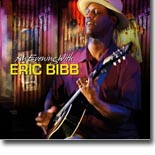 I've
always believed that Eric Bibb is a blues artist
that really should be better known by American blues
audiences. The native New Yorker, who now lives in
Sweden, is actually better known to European audiences.
I've
always believed that Eric Bibb is a blues artist
that really should be better known by American blues
audiences. The native New Yorker, who now lives in
Sweden, is actually better known to European audiences.
So, who's
Eric Bibb? He's the son of Leon Bibb, who was a
prominent folk musician on the New York scene of the
1960s. Bibb has recorded more than a dozen album and
regularly tours internationally.
An Evening
With Eric Bibb (M.C. Records) was recorded live at a
nightclub in Sydney, Austalia, and presents a good
overview of Bibb's repertoire. He's accompanied here by
bassist Dave Bronze; the sound is very good and the
respectful audience is knowledgeable about Bibb and his
music.
The show
kicks off with a happy, ragtime guitar number, "Good
Stuff," which immediately has the audience clapping
along with Bibb. He follows with one of his standards,
"Shingle by Shingle," a pleasant composition about being
grateful for what you've got. "Needed Time" is announced
as one of Bibb's favorite songs; it's a powerful,
spiritual number that he does well and is one of the
highlights of the album.
Even better
is Bibb's excellent tribute to John Cephas, "Right On
Time." He turns this original number into a raucous
gospel number with growling vocals.
Other
favorites include the delightful instrumental,
"Sebastian's Tune," with beautiful fingerpickin' guitar,
the humorous "Panama Hat," and a slow, dirge-like blues
from folk blues legend Odetta, "No More On The Brazos."
There would
be no better way to spend an hour than An Evening
With Eric Bibb. Highly recommended.
--- Bill
Mitchell